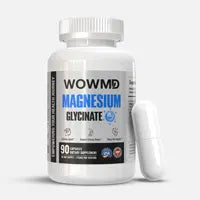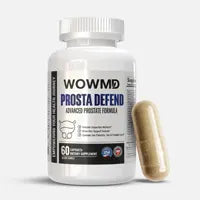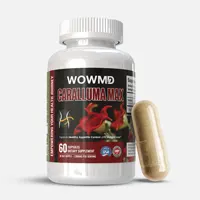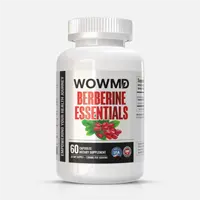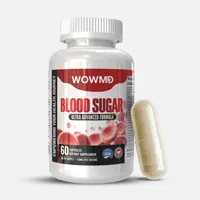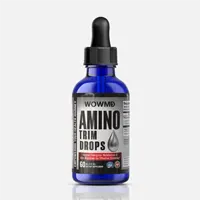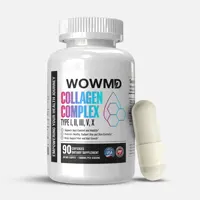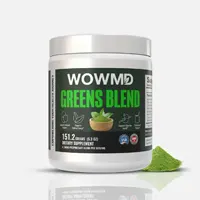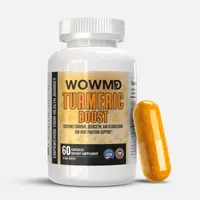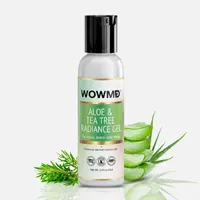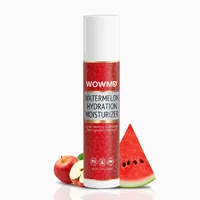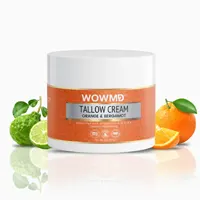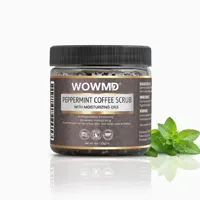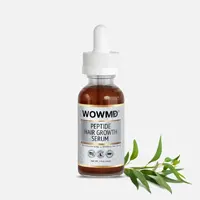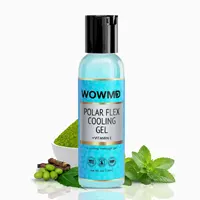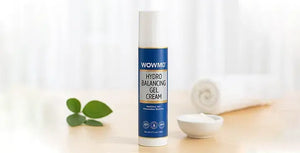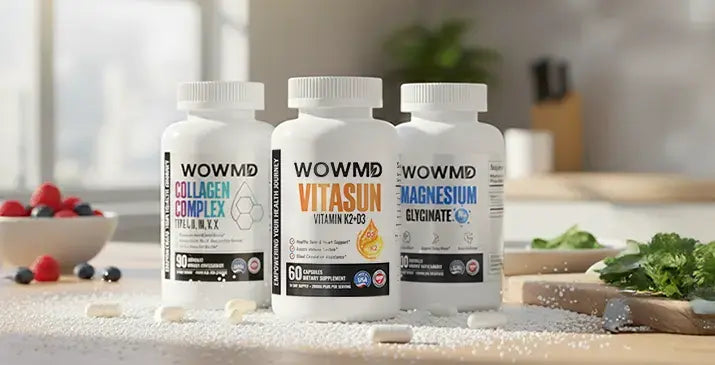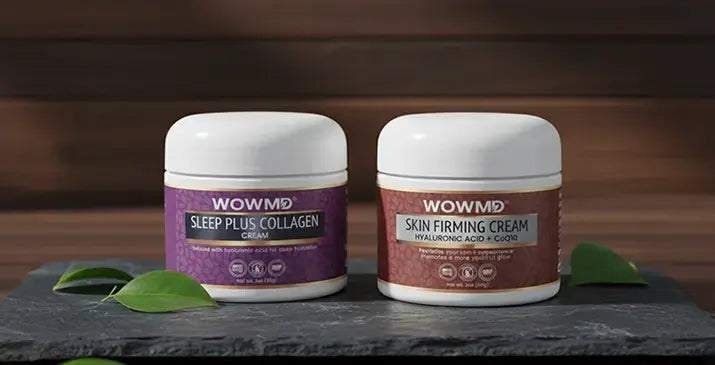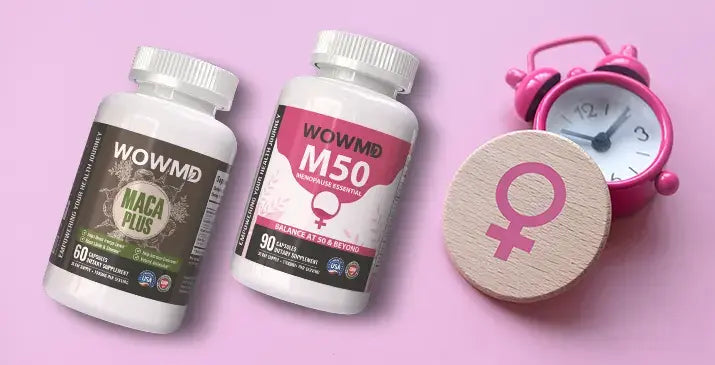Best Natural Joint Supplements for Effectiveness
Looking for an effective supplement for long term use that could help you manage joint pain? Learn about these supplements and how they can help.
Advertiser Disclosure: WOWMD independently vets all recommended products. If you purchase a featured product, we may be compensated. Learn why you can trust us.

Joint pain can make everyday things—like bending down, walking the stairs, or picking up your kids—feel like impossible tasks. Many people are turning to natural joint supplements as a gentler alternative to traditional medications.
In this guide, we’ll explore the most effective, clinically studied supplements for relief — and how to choose one that’s right for you.
👉 Try WOWMD Joint Gummies – Doctor-Formulated & Fast-Acting →
TL;DR
- Natural supplements offer safe, effective joint pain relief.
- Glucosamine, chondroitin, MSM, and turmeric support joint health.
- Omega-3s, collagen, and Vitamin D reduce inflammation.
- Boswellia, hyaluronic acid, and spirulina improve joint function.
- Consult a doctor; consistency and quality are crucial for results.
Understanding the Safety & Effectiveness of Natural Supplements
When you're dealing with joint pain, you want relief that's both safe and effective. Natural supplements have become increasingly popular because they tend to be easier on your body than many prescription medications.
Think of them as working with your body rather than forcing quick changes. Unlike stronger medications that might cause stomach problems or other issues, natural supplements usually have fewer unwanted effects.
However, it's worth noting that "natural" doesn't automatically mean risk-free. Quality matters tremendously when it comes to supplements. The best ones come from reputable manufacturers who test their products thoroughly and use high-grade ingredients.
These supplements often take a bit longer to show results compared to prescription medications, but the trade-off is that they're generally safer for long-term use.
How Natural Supplements Support Joint Health
Maintaining pain-free, flexible joints depends on quelling low-grade inflammation, keeping cartilage well supplied with raw materials, and preserving the slick synovial “oil” that cushions every step. A growing body of clinical and laboratory research shows that specific botanicals, fatty acids, and structural nutrients can intervene at each of these pressure points, offering a natural complement to conventional therapies.
Below is a concise look at the key biochemical pathways involved.
- Reducing inflammatory signals such as NF-κB, COX-2 and pro-inflammatory cytokines curbs the enzymatic “attack” on cartilage and bone.
- Stimulating chondrocytes to synthesize proteoglycans, type II collagen, and hyaluronic acid rebuilds the extracellular matrix that gives cartilage its shock-absorbing strength.
- Increasing synovial fluid viscosity with high-molecular-weight hyaluronic acid and boosting omega-3 content in joint membranes enhances lubrication, eases friction, and may improve range of motion.
Natural supplements typically act through one or more of these mechanisms:
- Anti-inflammatory modulators – curcumin, Boswellia serrata, omega-3 EPA/DHA, and MSM interrupt the COX-2/LOX and NF-κB cascades, leading to measurable drops in C-reactive protein and joint pain scores within weeks.
- Cartilage-building blocks – glucosamine sulfate, chondroitin sulfate, and bioactive collagen peptides directly feed cartilage cells, up-regulate aggrecan and type II collagen synthesis, and inhibit matrix-degrading metalloproteinases.
- Synovial lubricants – oral or injected hyaluronic acid restores the visco-elastic gel that cushions joints, while omega-3s enrich the lipid layer of synovial fluid, reducing stiffness and morning discomfort
Proven Natural Joint Supplements to Consider
| Supplement | Best For | Clinically Proven | Included in WOWMD? |
|---|---|---|---|
| Glucosamine | Cartilage repair | ✅ | ✅ |
| Turmeric | Inflammation | ✅ | ✅ |
| MSM | Stiffness & flexibility | ✅ | ✅ |
| Boswellia | Pain & mobility | ✅ | ✅ |
| Omega-3 | Lubrication | ✅ | ✅ |
Glucosamine
Think of glucosamine as the building blocks for your joint health. It's like having the right materials to repair a house – your body uses glucosamine to maintain and rebuild cartilage, the cushiony material between your joints. As we get older, our bodies naturally make less glucosamine, kind of like a factory slowing down production. This is where supplements come in handy.
When you take glucosamine supplements, you're essentially giving your body extra raw materials to work with. Many people notice improvements in their joint comfort after taking glucosamine for a few weeks to a few months. It's particularly helpful for knee pain and osteoarthritis. The best part is that glucosamine is generally very well-tolerated – most people can take it without any problems.
Look for supplements that provide 1,500 mg of glucosamine daily, which research has shown to be an effective dose. Some people find even better results when combining glucosamine with other joint-supporting nutrients, especially chondroitin sulfate.
Read More - Best Glucosamine And Chondroitin Joint Supplements For Effectiveness
Chondroitin Sulfate
Chondroitin sulfate works like a sponge in your joints, helping them stay lubricated and healthy. Imagine your joints as hinges on a door – they need proper lubrication to work smoothly without creaking or sticking. Chondroitin helps maintain this necessary moisture in your joints, making movement easier and more comfortable.
When paired with glucosamine, chondroitin becomes even more effective. It's like having a dynamic duo working together – glucosamine provides the building materials, while chondroitin helps maintain the environment those materials need to work properly. Many studies show that people who take both supplements together experience better results than those taking either one alone.
Chris D’Adamo, PhD, Director of Research & Education at the University of Maryland School of Medicine Center for Integrative Medicine, says that “Glucosamine and chondroitin have anti-inflammatory properties. They also have some cartilage-protecting effects through a variety of different mechanisms. ”
A typical effective dose is around 800-1,200 mg daily, though you might see benefits with as little as 400 mg when combined with glucosamine. The key is consistency – taking it regularly allows it to build up in your system and provide maximum benefits.
MSM (Methylsulfonylmethane)
MSM might have a complicated name, but its benefits are straightforward. This sulfur-containing compound helps reduce inflammation and pain in your joints. Think of it as a natural pain reliever that also helps improve flexibility. Many people report that MSM helps them move more easily, especially first thing in the morning when joints tend to be stiffest.
What makes MSM particularly special is how it works on multiple levels. It helps reduce pain, supports the formation of connective tissue, and may even help your body produce its own antioxidants. Regular users often report that MSM helps them feel more limber and experience less day-to-day joint discomfort.
The recommended dosage typically ranges from 1,000 to 3,000 mg per day, though some studies have safely used higher amounts. Starting with a lower dose and gradually increasing it can help you find what works best for your body.
Turmeric
Turmeric has been used for thousands of years in traditional medicine, and modern science is catching up to what ancient healers knew all along. The active compound in turmeric, called curcumin, helps reduce inflammation throughout your body. Think of it as a natural fire extinguisher for inflammation – it helps cool down the heat and swelling in your joints.
For the best results, look for turmeric supplements that also contain black pepper extract (piperine). This combination helps your body absorb the curcumin much better – up to 2,000% better, in fact! Many people find that taking 500-1,000 mg of turmeric extract daily helps reduce their joint pain and stiffness.
A useful tip is to take your turmeric supplement with a meal that contains some healthy fats, as this can also help with absorption. Many users report noticing improvements within a few weeks of consistent use.
Omega-3 Fatty Acids
Omega-3 fatty acids are like oil for your joints' gears. These essential fats help reduce inflammation throughout your body and can make a real difference in how your joints feel. While you can get omega-3s from eating fatty fish like salmon or sardines, supplements offer a convenient and concentrated source.
Fish oil supplements are the most common form, but if you're vegetarian or vegan, you can find omega-3s from algae sources too. A daily dose of 1,000-2,000 mg of combined EPA and DHA (the two main types of omega-3s) is typically recommended for joint health.
When choosing an omega-3 supplement, quality is crucial. Look for products that have been tested for purity and are free from heavy metals. Taking them with meals can help prevent any fishy aftertaste and improve absorption.
READ MORE - Difference Between Fish Oil and Omega 3
Collagen
Collagen is like the glue that holds your joints together. It's the most abundant protein in your body and plays a crucial role in maintaining strong, flexible joints. As we age, our natural collagen production decreases, which can lead to stiffer, less flexible joints.
Supplementing with collagen can help support your joint structure and reduce discomfort. Many people report improved flexibility and less joint pain after adding collagen to their daily routine. Look for hydrolyzed collagen or collagen peptides, as these forms are easier for your body to absorb.
A typical dose ranges from 10-20 grams daily, and you might want to take it on an empty stomach for better absorption. Some people like to add their collagen powder to morning coffee or smoothies to make it part of their daily routine.
RELATED - Collagen For Joint Pain Relief
In this video, our valued client reviews the WowMD Collagen Complex, highlighting how this supplement supports joint health and skin radiance.
Vitamin D
Vitamin D is like a master key that helps unlock many aspects of joint health. It helps your body absorb calcium properly, supports immune system function, and can even help reduce inflammation. Many people don't get enough vitamin D, especially if they spend most of their time indoors or live in less sunny climates.
A blood test can help determine if you're deficient, but many people benefit from taking 1,000-2,000 IU of vitamin D3 daily. Taking it with vitamin K2 can help ensure proper calcium absorption and utilization in your body.
READ MORE - Vitamin D Supplements For Improving Joint Mobility
Boswellia
Boswellia, also known as Boswellia serrata, is a natural resin extract known for its potent anti-inflammatory and analgesic properties, making it an excellent supplement for joint health. Research shows that Boswellia not only helps reduce joint pain and stiffness but also improves joint function, which can be particularly beneficial for people with osteoarthritis.
Clinical studies have demonstrated pain reduction as early as 5 days after starting Boswellia supplementation, with significant improvements in pain scores (up to 62%) and joint stiffness seen by 90 days.
The effectiveness of Boswellia is often attributed to its active compounds, such as 3-acetyl-11-keto-β-boswellic acid (AKBA), which help decrease pro-inflammatory markers like TNF-α and interleukins.
A typical effective dosage ranges from 100 to 300 mg daily of standardized Boswellia extract, with benefits generally observed after 4 weeks of continuous use. Studies report that doses of 150 mg to 300 mg daily reduce pain and stiffness while enhancing mobility and quality of life. In addition:
- Boswellia supplementation has been shown to reduce markers of inflammation such as C-reactive protein and IL-6.
- Patients experience improved walking distance and physical function tests following consistent use.
- The supplement is generally well tolerated with a good safety profile reported in clinical trials.
Hyaluronic Acid
Hyaluronic acid plays a crucial role in maintaining joint health by acting as a natural lubricant in the synovial fluid, which cushions joints and reduces friction between bones. Supplementation with hyaluronic acid, typically at doses of 80–200 mg daily, has been shown to effectively reduce pain and improve joint function, especially in people with osteoarthritis aged 40 to 70 years.
It not only helps keep the joints well-lubricated, preventing bones from grinding against each other, but also supports cartilage regeneration and reduces inflammation linked to joint degeneration. Key benefits and usage points include:
- Daily oral doses ranging from 80–200 mg for at least two months to see significant pain relief in osteoarthritic joints.
- Intra-articular injections (usually 20 mg per week for 5 weeks) are also used to offer localized, longer-lasting relief, though supplements provide a safer long-term option.
- Hyaluronic acid may reduce the need for NSAIDs by nearly 50-60%, lowering risks associated with long-term painkiller use.
- It is well-tolerated with minimal side effects, making it a reliable choice for ongoing joint support.
Spirulina
Spirulina, a blue-green algae packed with proteins, vitamins, and antioxidants, offers significant benefits for joint health, particularly through its potent anti-inflammatory and immunomodulatory effects.
Research shows spirulina can reduce key inflammatory markers like TNF-α, IL-6, and COX-2, which are involved in joint inflammation and degradation, making it effective against conditions like rheumatoid arthritis.
Notably, studies indicate that doses around 200-400 mg/kg in animal models significantly lowered arthritis symptoms and preserved joint structure by reducing oxidative stress and modulating immune responses.
In humans, typical supplementation ranges often fall between 1-3 grams daily, supporting joint health by decreasing inflammation and oxidative damage. Key benefits include:
- Reduction of pro-inflammatory cytokines linked to joint pain and swelling
- Antioxidant support through increased glutathione levels
- Potential to inhibit enzymes causing cartilage breakdown
Ashwagandha
Ashwagandha is a powerful natural supplement that supports joint health by reducing inflammation and alleviating pain associated with conditions like osteoarthritis and rheumatoid arthritis.
Research shows it exerts analgesic and anti-inflammatory effects that help protect cartilage and improve joint mobility. Clinical trials have demonstrated significant reductions in knee pain and swelling with daily doses of 125 to 250 mg of standardized ashwagandha extract over 12 weeks.
It also supports muscle strength and recovery, enhancing physical performance — for instance, doses of 300-600 mg twice daily have increased muscle mass and endurance in healthy adults.
Green Tea
Green tea is a powerful natural supplement for joint health, thanks to its rich content of polyphenols, especially epigallocatechin gallate (EGCG), which possess potent antioxidant and anti-inflammatory properties.
Research shows that consuming around 4 to 6 cups of green tea daily, providing roughly 240 to 750 mg of catechins, may significantly reduce inflammation markers and improve symptoms in joint conditions like rheumatoid arthritis and osteoarthritis. Key benefits include:
- Decreased joint pain and stiffness by reducing inflammatory cytokines and cartilage degradation enzymes.
- Protection against bone loss and preservation of cartilage integrity by modulating bone metabolism markers.
- Antioxidant effects that combat oxidative stress, which is a major factor in joint degeneration.
Ginger
Ginger is a potent natural supplement known for its anti-inflammatory and pain-relieving properties, particularly beneficial for joint health. Studies have shown that taking standardized ginger extract daily can significantly reduce knee pain related to osteoarthritis, with effective doses typically ranging from 250 mg taken three to four times a day, not exceeding 4,000 mg daily to avoid side effects like heartburn or diarrhea.
Ginger works by inhibiting inflammatory processes, including reducing markers such as C-reactive protein (CRP), and has been found to modulate immune function beneficially in rheumatoid arthritis cases.
Additionally, a daily intake of around 1 gram of ginger powder has been linked to lowered inflammatory markers in elderly patients with knee osteoarthritis. For optimal results, ginger is best taken in capsule form with meals to maximize absorption and minimize gastrointestinal discomfort. Moreover, a smaller dose starting around 200 mg daily, gradually increasing, is advisable for those new to supplementation.
Doctor-Formulated Relief, Delivered to Your Door Joint discomfort doesn't have to hold you back. 🌿 Explore WOWMD’s Top-Rated Joint Health Supplements →
How to Choose the Best Natural Joint Supplement
- Look for Quality Ingredients: Prioritize supplements that undergo third-party testing to verify purity and potency, ensuring they are free from unnecessary fillers or contaminants.
- Consider Ingredient Forms and Dosages: The effectiveness of ingredients can vary significantly by their form. For example, choose curcumin paired with piperine for enhanced absorption, or specific forms of glucosamine (like sulfate) that have better research backing. Ensure dosages align with clinically effective amounts.
- Check for Reputable Brands: Research brands for transparency in their sourcing and manufacturing processes. Look for companies with positive customer reviews and a history of producing high-quality supplements.
- Understand Your Needs: Before purchasing, consider consulting a healthcare professional. They can provide personalized advice based on your specific health conditions, current medications, and individual joint health requirements.
Potential Side Effects and Important Considerations
While natural joint supplements offer promising benefits, it's crucial to be aware of potential side effects and important considerations before integrating them into your routine.
Common, Mild Side Effects:
- Digestive upset (e.g., mild nausea, bloating, diarrhea)
- Allergic reactions (rare, but possible with certain ingredients like shellfish in glucosamine)
- Mild headaches
Crucial Medical Consultation:
It is strongly advised to consult with a healthcare professional or doctor before starting any new supplement regimen. This is especially vital if you are currently taking any medications (as supplements can interact with prescription drugs) or have pre-existing medical conditions (such as diabetes, heart conditions, or bleeding disorders).
Your doctor can provide personalized advice, assess potential risks, and ensure the supplement is appropriate for your specific health profile.
Individual Results and Consistency:
It's important to understand that results from natural joint supplements can vary significantly from person to person. Factors such as the severity of joint issues, individual body chemistry, and consistency of use all play a role.
For optimal effectiveness, consistency is key; benefits are typically observed with regular, long-term use rather than immediate results.
Conclusion
Conclusion
Improving your joint health with safe and natural supplements is like building a house – it takes time, quality materials, and consistency. While you might be eager for quick results, remember that natural supplements often work gradually, building up their beneficial effects over time.
Take Action for Your Joint Health
Start your journey to better joint health by choosing one or two supplements that align with your specific needs. Remember to:
- Begin with basic supplements like glucosamine and chondroitin
- Give supplements enough time to work (usually at least 4-8 weeks)
- Keep track of how you feel to gauge effectiveness
- Consider combining different supplements for enhanced benefits
- Always check with your healthcare provider before starting any new supplement routine
The path to healthier joints doesn't have to be complicated. By choosing top rated high-quality natural supplements and being patient with the process, you can work towards better mobility and comfort.
You’ve just discovered the most effective natural joint support ingredients — now it's time to act.
🎯 Feel the difference in 4–6 weeks with consistent use.
🛒 Shop WOWMD’s Top-Selling Joint Gummies Today →
Remember, what works best for one person might not work as well for another, so don't be afraid to adjust your approach based on how your body responds.
FAQs
Our Top Picks
NutriMax Essentials - Advanced Daily Multivitamin
4.8 / 5.0
(208)208 total reviews
About WOWMD Staff
See Our Editorial Policy > Meet Our Health Expert NetworkThe WOWMD Staff category features a diverse team of writers, each bringing specialized knowledge in areas such as nutrition, fitness, wellness, and more. Articles in this category benefit from insights provided by multiple experts. All content is peer-reviewed and regularly updated to ensure compliance with our editorial standards.
You May Also Like
Popular Stories
- The Best Beef Tallow Products for Radiant Skin: A 2026 Guide
- Holy Basil : Ayurveda’s Herb for Balance, Immunity & Everyday Calm
- Best Gel Moisturizers for Hydration & Skin Care in 2026
- 7 Best Effective Supplements for Improving Bladder and Prostate Health in 2026
- 4 Best Cooling Gels for Skin and Body: Instant Refreshment and Relief
- 4 Best Hyaluronic Acid Serums for Skin Hydration - Tested & Reviewed
References
WOWMD follows strict sourcing guidelines to ensure the accuracy of its content, outlined in our editorial policy. We use only trustworthy sources, including peer-reviewed studies, qualified experts, and information from top institutions.
- Effectiveness and Safety of Glucosamine in Osteoarthritis: A Systematic Review - PMC https://pmc.ncbi.nlm.nih.gov/articles/PMC10366893/
- Effects of Oral Chondroitin Sulfate on Osteoarthritis-Related Pain and Joint Structural Changes: Systematic Review and Meta-Analysis - PubMed https://pubmed.ncbi.nlm.nih.gov/30859538/
- Comparison of Glucosamine-Chondroitin Sulfate with and without Methylsulfonylmethane in Grade I-II Knee Osteoarthritis: A Double Blind Randomized Controlled Trial - PubMed https://pubmed.ncbi.nlm.nih.gov/28790224/
- Vitamin D and Bone Health - The Journal of Nutrition https://jn.nutrition.org/article/S0022-3166(22)01747-3/fulltext
- Omega-3 Fatty Acids for Joint Health: A Comprehensive Guide - Rheum4us https://rheum4us.org/omega-3-fatty-acids-for-joint-health/
- (PDF) Collagen: A Brief Analysis https://www.researchgate.net/publication/337856728_Collagen_A_Brief_Analysis
- Anti-Inflammatory Effects of Curcumin in the Inflammatory Diseases: Status, Limitations and Countermeasures - PubMed https://pubmed.ncbi.nlm.nih.gov/34754179/
Evidence Based Research
This WOWMD content has been reviewed, as well as checked for facts, so as to guarantee the best possible accuracy.
We follow a strict editorial policy, especially related to the sources we use. Our articles are resourced from reputable online pages, with research drawn from academic institutions and peer-reviewed studies. You can click on the numbers in the parentheses (1, 2, etc.) and check out those references.
The feedback form on this page can be used to report content that is not accurate, up-to-date or questionable in any manner.
We do NOT intend for the information presented through our articles to replace the medical relationship with a qualified physician, nor does it represent specialized advice.
 Alpha Man Power Pack
Alpha Man Power Pack All-Day Fat Burn Trio
All-Day Fat Burn Trio Better Immunity Bundle
Better Immunity Bundle  Calm & Sleep Duo
Calm & Sleep Duo Cognitive Health & Vision Combo
Cognitive Health & Vision Combo Complete Weight Loss Bundle
Complete Weight Loss Bundle Core Vitality Trio
Core Vitality Trio Energy Booster Combo
Energy Booster Combo Focus Fuel Trio
Focus Fuel Trio Glow & Balance Duo
Glow & Balance Duo Health Balance Trio
Health Balance Trio Heart Care Bundle
Heart Care Bundle Joint Health Support Combo
Joint Health Support Combo Men's Immunity & Prostate Health Bundle
Men's Immunity & Prostate Health Bundle Metabolism Boost Duo
Metabolism Boost Duo Natural Skin Care Bundle
Natural Skin Care Bundle Peak Performance Duo
Peak Performance Duo Relax & Recharge Duo
Relax & Recharge Duo Skin Detoxification Bundle
Skin Detoxification Bundle Smart Energy Trio
Smart Energy Trio Stress + Energy + Wellness Combo
Stress + Energy + Wellness Combo  Total Burn Ignite Trio
Total Burn Ignite Trio Total Harmony Pack
Total Harmony Pack Workout Supplements Combo
Workout Supplements Combo